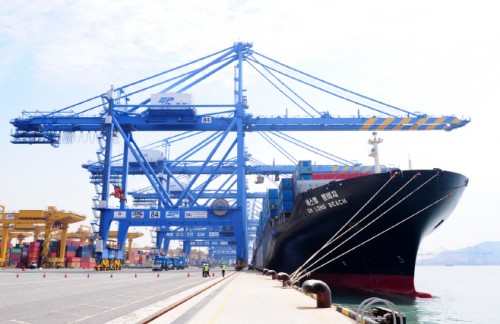 |
By AsiaToday reporter Moon Noo-ri
The government is looking for ways to resuscitate the country’s battered maritime industry through a 5-year restructuring plan, however domestic shipping companies are not being able to launch investments actively blocked by strict accounting standards. This is by contrast with global shipping companies, such as Maersk, that are actively expanding their fleet backed by the government. As a result, there are growing voices urging to ease legal regulations in accounting standards that block domestic shipping companies’ investments and eventually lead to deterioration of their financial structures.
According to the shipping industry on Thursday, the Ministry of Oceans and Fisheries plans to place orders for new ships in the form of investment or guaranteeing the ship purchase system, worth 2 trillion won, this year. This is in line with the government’s five-year restructuring plan for the nation’s shipbuilding and shipping sector announced last April. Major initiatives for the plan include steadily securing freight, expanding the number of competitive vessels, and helping to improve the financial structure of domestic shipping companies. The government also plans to invest an additional 8 trillion won by 2020 to place orders for about 200 commercial vessels.
However, shipping industry observers point out that such policy could worsen the financial structure of corresponding shipping companies when they actually expand the number of vessels. If domestic shipping companies expand vessel investment, they are likely to increase their debt-to-equity ratios as their financing costs increase, hindering investments.
As a result, more voices are pushing the idea of creating an exceptional governmental rule, which is reflecting physical assets only as the form of net assets in the financial statements, as long as certain requirements are met. They point out that the government should help the companies reduce their debt ratio by including the cost of its vessels in assets instead of debt, as vessels themselves are assets.
Many believe there should be an exception clause similar to that of construction companies as large-scale investment is involved when vessels are secured. Since 1999, the government has been applying an exceptional accounting rule to rental housing builders. The rule is that if certain requirements are met regarding finance leases, they are deducted from the assets. Then construction companies would be able to reduce their debt ratio and improve their financial structure by allowing their houses after lease to be listed as net assets.
For example, purchasing a vessel worth 1,000 won will normally require borrowing 900 won while providing your own capital of 100 won. For conventional method, the debt ratio would reach 900 percent. But if there is an exceptive clause on accounting, the 900-won loan will be included in the assets of 100-won vessel, and the debt ratio would be zero.
#Accounting #shipbuilding industry
Copyright by Asiatoday
Most Read
-
1
-
2
-
3
-
4
-
5
-
6
-
7





















